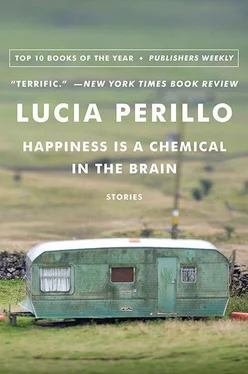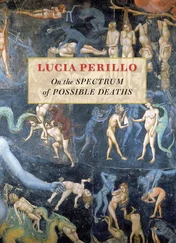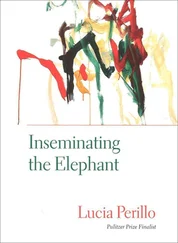Lucia Perillo
Happiness Is a Chemical in the Brain: Stories
Don’t tell me about bad boys. I’ve seen my black clouds come and go. Coming they walk with their shoulders back like they’ve got a raw egg tucked inside each armpit, and they let their legs lead them. Going, you can count on the fact that their butts will cast no shadow on those lean long legs. You can’t compete in the arena of squalid romance if you’re one of those guys shaped in the rear like a leather mail sack: you’re automatically disqualified. That’s just the way it is. I didn’t make the rules.
My prodigals make up for slender means by wearing their jeans tight enough so that their billfolds have a hard time sliding in. And they make up for the fact they’re usually kind of stupid by not saying much. This is important. This is the litmus test. The last thing you want is a desperado with a big mouth; you might as well invite a wild elephant home for dinner.
See, for years I have done some serious observation, up close and from a distance. I’ve seen them hawk and spit before the drive-up window, I’ve watched them jimmy the pinball machine at King Arthur’s Reef. Yeah, yeah: I know King Arthur had a table, he didn’t have a reef, but ours is a coastal town and the natives feel claustrophobic inside any bar that doesn’t have a nautical theme. Why it matters I don’t know, because inside is always dim — so you can’t see that the only decorating theme is duct tape, which holds the stuffed fish to the walls and crisscrosses the red vinyl in the booths, and even bandages some of the more expensive bottles of liquor that no one has the heart to throw away because of something as picayunish as a little broken glass.
But out of all the dives in town, the Reef is probably the best laboratory for studying the players, the wannabes with their ball caps and Aerosmith T-shirts, and the shy bloodhounds who rest their elbows on the bar and silently massage their dewlaps. Inside every dissolute romantic there’s a brooding Schopenhauer, with a chronic melancholy that he nurses like a sourball in his cheek. He can see the whole arc of his life — from the uphill curve that is his present freedom to the downhill slope that’ll lead him to some evangelical storefront church where he’ll suddenly find himself swaying with his hands raised in the air. And the ones who come without this flaring sense of precognition are just losers, plain and simple.
Like one night in the Reef there’s this guy sitting on a barstool, checking me out over his shoulder from time to time? The fact that he’s missing part of one finger shrouds him with the kind of mystery that ought to make him a contender, were this aura not counteracted by his jeans riding so low they expose a length of his crack that’s about equal to what’s missing from his hand. Which knocks him out of the running, especially when a few boilermakers later he erupts in my direction with something about letting him know whenever I’m ready to have him take me outside to his car, where he’s going to — his phrasing— eat me out .
I’m sitting in a booth with my sister Louisa, who giggles. “Don’t giggle,” I tell her. “What that guy said to us wasn’t funny.” Even though she’s my older sister, since she has Down syndrome I have to explain everything.
“I think he’s funny,” she says in that woofy voice of hers. “I think he’s cute. I think that boy wants to be my boyfriend.”
This is the kind of thing Louisa’ll say that drives a stake into our mother’s heart. Lately Mum’s been talking about getting Louisa’s tubes tied, a plan I could condone on pragmatic grounds but against which I’ve nonetheless felt compelled to launch a squeak or two of protest. Louisa’s been living with Mum ever since she got kicked out of the group home for repeated makeup theft, and even though Louisa’s relatively self-sufficient — she can ride the bus, she has a job assembling calendars and pens — my mother won’t rest easy until Louisa’s fate is sewn up. I mean, Louisa needs a baby about as badly as she needs a scholarship to MIT, but then part of me says: What right do we have to go monkeying around with Louisa’s body? Since when did we set up camp between her legs? I even feel squeamish bringing Louisa into the bar, like someone’s going to call Child Protective Services on me, though Louisa’s well past thirty. When the bartender checks our IDs she lingers for a long time with Louisa’s, her eyes ping-ponging between the mug shot and Louisa’s face.
After a few moments of scrutiny the bartender slides her ID across the table. “What does she want?” the bartender asks me.
One thing Louisa’s figured out is this what-to-do-when-people-refuse-to-speak-to-you routine. “Beer!” she pipes angrily.
“You want me to bring her a light beer?”
“St. Pauli Girl,” Louisa insists. Where she gets this from I don’t know. St. Pauli Girl . But the bartender’s still looking at me.
“Hey, I’m her sister, not her mother. Give her what she wants. She’s not the one driving.” And I order a St. Pauli Girl for myself too, just so Louisa won’t get paranoid that she’s done something weird.
Anyway, the bartender vindicates herself later, by taking care of Finger when he makes his suggestion about taking me outside. Or maybe this is ego talking, my assuming that Finger was bird-dogging me and not my sister, who is after all not a bad-looking woman, especially with her new perm and John Lennon eyeglass frames. I guess the bartender decides to step in as Louisa’s protectress since she thinks I’m being too lax about that job. Bartender says something to Finger underneath her breath, something threatening enough to make his eyes go wide. Then to soothe us all she takes a bunch of change from the till and drops it into the jukebox.
This does the trick: the bar falls silent while the lead guitar knifes its way through the intro. Then, with the grace and synchronicity of ballerinas, all the guys start playing air guitar by strumming the folds of skin around their navels. Finger tilts woozily over his glass, and by the time the song ends his arms are folded on the bar with his head nested inside, whistling the strange birdcalls of sleep.
“Look,” Louisa says, elbowing me. “That funny boy is sleeping.”
“I told you he’s not funny. He’s a jerk.”
“Yeah,” she says, bobbing her head. Often I find myself wishing Louisa did not agree so enthusiastically with everything I say. It forces me to police myself all the time, and this policeman speaks in a voice I recognize as belonging to my mother, who’ll say (as in defense of turning off Louisa’s plumbing), I wish you would start considering your sister’s future more seriously. All I’m trying to do is set things up so that Louisa will be less of a burden when the day comes that neither I nor your father are around.
My mother always gives the words your father an extra jab. He has a new wife who lives with him in a house overlooking the Tacoma Narrows and the bridge that replaced the one they call Galloping Gertie because it turned into Jell-O on a particularly windy day. My mother, on the other hand, is stuck living with Louisa in a trailer, though she becomes offended when I refer to it as such. “It’s a mobile home ,” she insists huffily. “And I’ve got the clubhouse. I notice you don’t mind coming down off your high horse whenever you want to use the pool.”
As you can tell, it’s a sore subject — my mother stuck with a clubhouse whose lone assets are a machine that dispenses last year’s Ho Hos, and a pool that can barely accommodate a decent cannonball, while my father’s got Galloping Gertie II and the whole of Puget Sound right in his living room. My mother thought she could salve her pride by hiring a decorator, whose handiwork ended up making the trailer look like the set of a late-night TV talk show, which must remind Louisa all the more about how her life has paled ever since she had to leave the group home, where she could tussle with her girlfriends on the battered furniture every night, like attending summer camp forever. Louisa is simply too big for my mother’s place — and it’s not so much her fatness as the way that her high spirits make her seem loud and clumsy. And my mother takes them as evidence of Louisa’s naïveté and thinks we must band together to fend off evil.
Читать дальше












